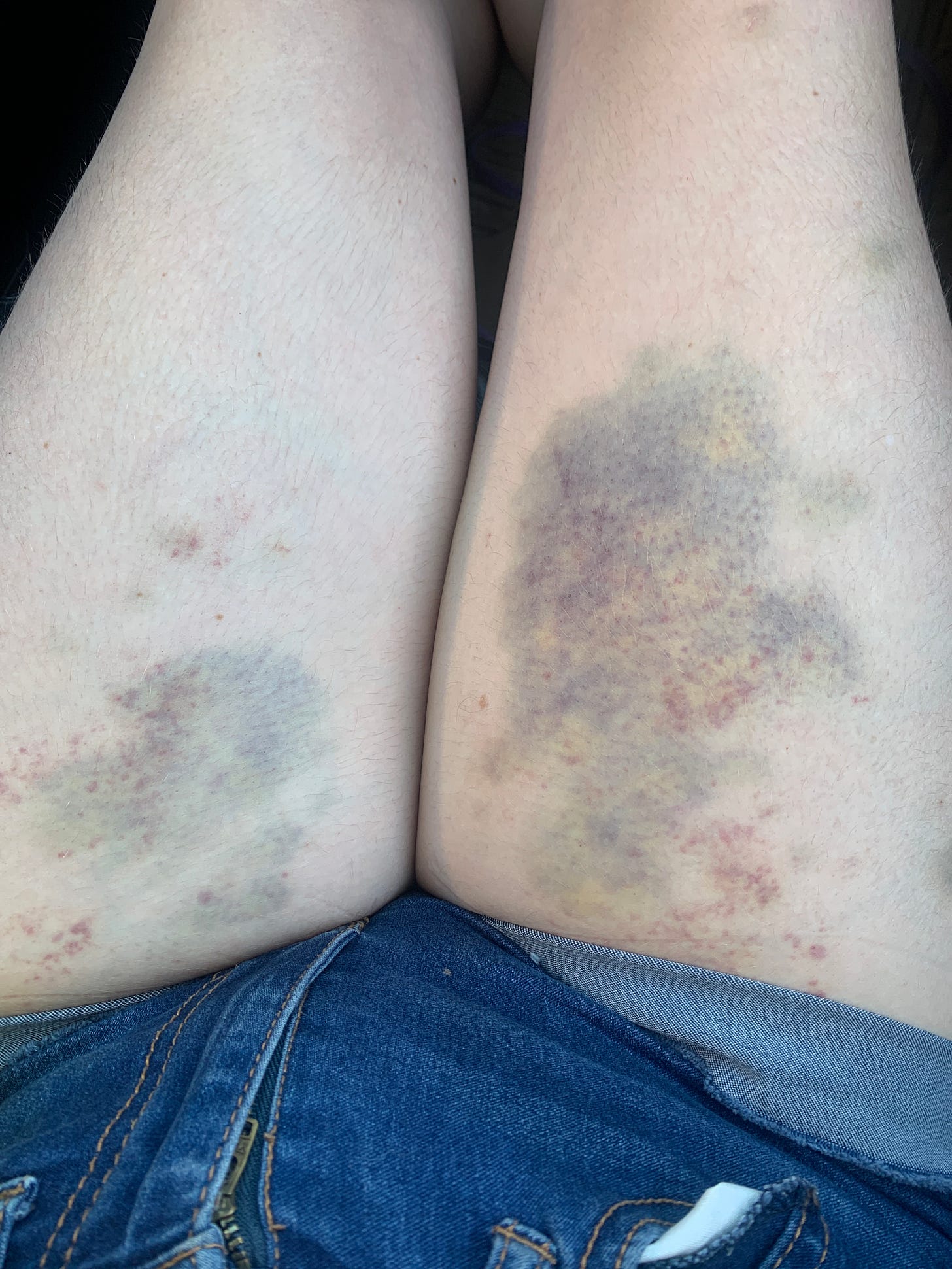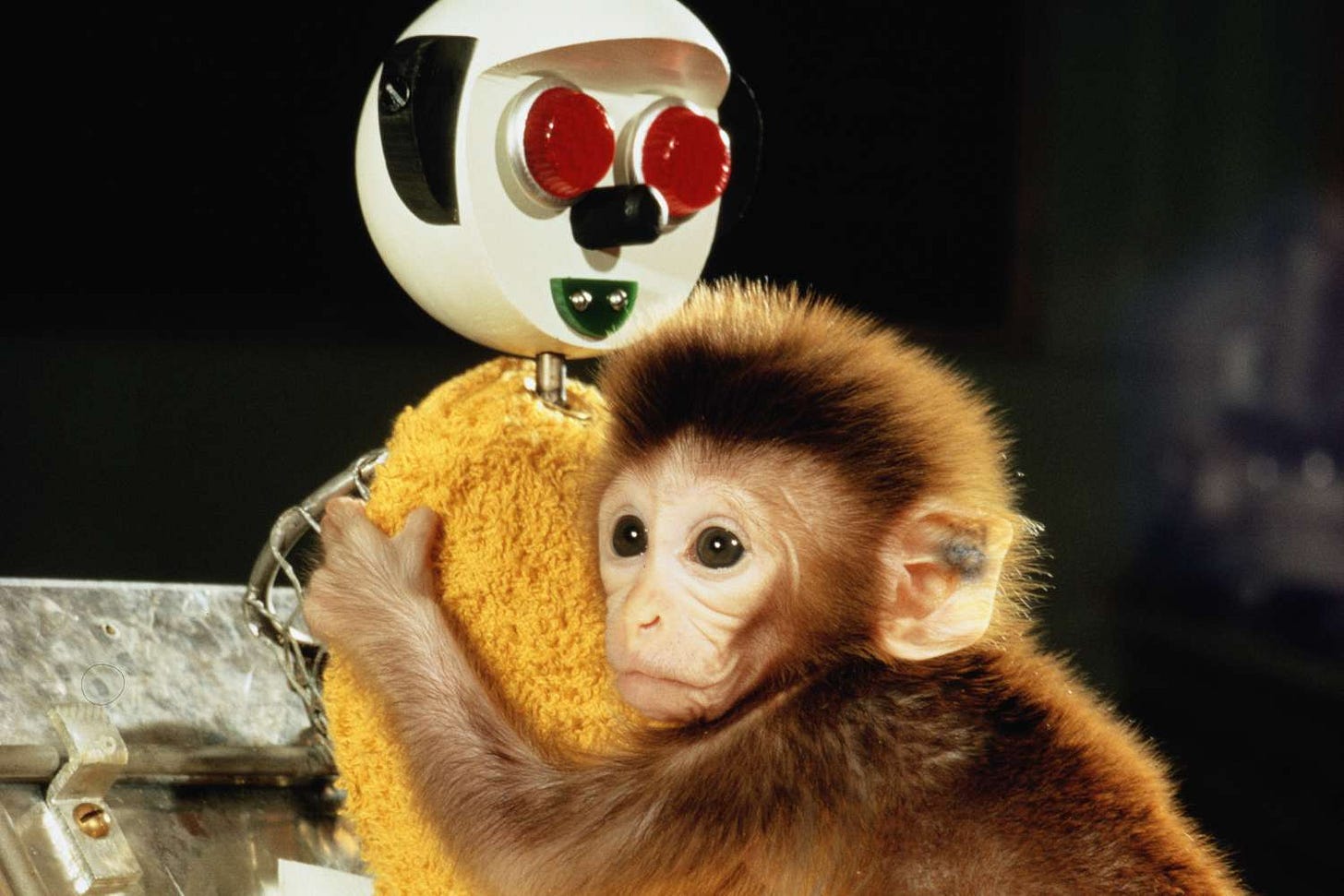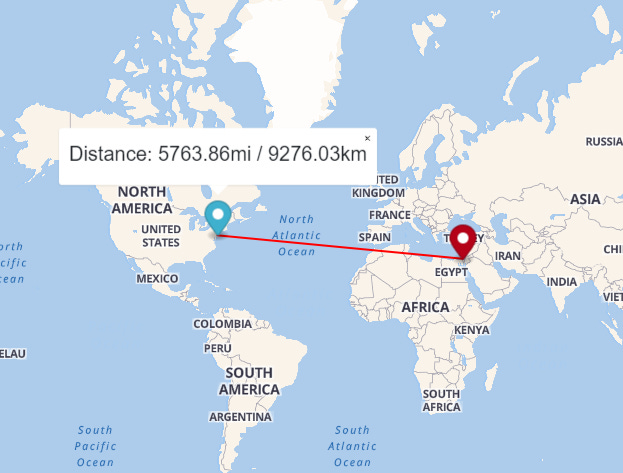Warning: hot pics below. Adult pics! Evidence of kink!
What did you expect of a harlot? You have been warned.
Hello
I slide into the backseat of a stranger’s car and the driver tells me about her dead son. I ask his name (Reggie). At a stop sign she pulls out her wallet to show me pictures of him smiling. I can’t completely tell but I offer it anyway, “his face is the same shape as yours.”
She likes that. She relays God’s blessings on me as my hand touches the door. I wish her a safe, lucrative day before closing it. When I leave, we’re something other than strangers.
When I smile, I do it knowing that death is inevitable.
Client
Content advisory— bruises below.
“I’ve never spoken these thoughts aloud but I’ve always had them,” my client whispers through the phone.
They don’t want anyone to think these thoughts are their true nature, so they suppress and punish their mind into silence. It doesn’t work because parts of us don’t like being silenced— the “thoughts” scream and eventually take over when they manage to break free of suppression. It’s almost like a grounded teenager throwing a house party when their parents are away for the weekend. “I don’t know when I’ll get this chance again so I’m making it count.”
It’s taken time but we talk about it. Assessing logic or morals isn’t my place in this interaction (though I only work with people who actively seek a more loving and just world). We play detective and narrow in on the origins of their pain. We thank the part for accepting our inquiry; it’s no easy feat. Avoidance of pain is a fundamental reason that most people invest their lifetime outrunning their own minds. Being seen hasn’t always worked out and that wound sears into our consciousness before it’s buried beneath new stimuli and beliefs.
This piece of my fellow human, however, takes what feels like a massive risk in revealing the memories it holds. We listen to understand. We ask what this part might do or believe if it could choose to do or believe something new. When enough trust is there and a bit of luck too, the part considers that new ways might be possible.
When we’re really lucky, the part relinquishes control and trusts the Safe Enough Adult carrying him to act in their place. This is an extremely simplified example of the healing process accessible through Internal Family Systems. As you may imagine, gentle reader, shifts of this magnitude require lots of consideration and care.
We all have inherited ideas that don’t necessarily belong to us anymore, and death is inevitable.
Primate
Content advisory— animal abuse.
Are you familiar with the Cloth Vs. Wire Mother Experiment by Henry Harlow? Late ‘50s, early ‘60s. I’m really asking. I’ll tell you either way.
What this man did to living beings is sick… sick and sickening but informative for our purposes today so if you can, please bear with me. If you can’t, please don’t withstand more than your capacity for my sake. I ask that you act in alignment with your body/mind and take care. We’ll see you for the next one.
Leading psychologists of the time believed that infants grow attached to parents solely because parents provide food. Harlow challenged this as an oversimplification. He investigated in a few ways, all of which involved removing infant monkeys from their biological mothers immediately after birth. It turns my stomach to think about but if you have it in you, let’s continue.
In his first experiment, Harlow put two groups of infant monkeys in cages with two replacement mother figures: one made of wire and the other, terrycloth. In one group, both of the mothers had food. In the second group, the soft mother had no food and wire mother had an attached bottle of milk. “Both groups of monkeys spent more time with the cloth mother… [unless] hungry… If a frightening object was placed in the cage, the infant took refuge with the [her].”
Harlow presumed, then, that primates prefer comfort over consistent access to food. Or… that primates (as we are) prioritize feelings of safety and warmth over more basic physical needs. This may explain why people accept and even prioritize intimate relationships with people who don’t improve their lives in any way outside feelings of warmth and safety. But I’m no psychologist.
In his second experiment, Harlow chose for the monkeys to have just one mother assigned— either the wire mother (with food) or the terrycloth mother (without food). The monkeys ate and grew regularly without noticeable differences in physical development. Commonalities end there. The monkeys without comfort… with the wire mothers…. they were: a. more reserved and anxious b. socially incongruent c. “easily bullied and wouldn’t stand up for themselves” d. struggling with mating e. “inadequate mothers” themselves.
Interesting that even an inanimate object—it’s warmth channeling a sense of security— helped the monkeys fit in better with peers. I wonder how much of my ability to connect with people today can be attributed to the dog my parents trained to guard my crib. His name was Sinbad, because of course it was.
The third experiment is somehow more upsetting. This time, Harlow again removed another set of babies from their mothers and he isolated them completely. No wire or terrycloth mother. No contact with each other. No contact with the humans studying them. The little babies were alone for 3 months up to an entire year. In isolation, they would “clutch their own bodies and rock compulsively”. Familiar.
For Harlow’s final experiment, once again he raised the stakes— I’m warning you, this part is disturbing as fuck. It’s ok and even good to skip it, especially if you’re reading before bed and/or are a survivor of intense childhood abuse, including neglect.
For his final experiment, Harlow inserted the isolated infants with other monkeys “to see what effect their failure [or rather inability] to form attachment had on behavior.” Harlow noted that the babies who were isolated for “just” 3 months could recover and form normal enough connections with peers . However, his research revealed that the longer the newborns faced isolation, the less likely their healing became.
Well, can you guess how the monkeys who survived Harlow’s little experiment responded to the sudden introduction? The majority of the monkeys were terrified and quickly adapted aggressive behaviors to ward off the others in a confused defense of self. They never learned to socialize or communicate. They were bullied by peers. They even harmed themselves, “tearing hair out, scratching, and biting their own arms and legs.” Some stopped eating until they died. BIGGEST TW: When some of them somehow became mothers, they behaved “so neurotically they smashed their infant’s face into the floor and rubbed it back and forth.”
I’m sorry I had to tell you that. One last thing about it and then the subject shifts, I promise.
In a dreamlike manner, a 4th experiment crawls into my mind: a new vision of evil. The terrycloth mother and the baby are there. When a frightening object is placed in the room the baby clings to its protector, and everything is fine. The second day it’s the same thing. Warm. Safe. Something like love.
On the third day, for no apparent reason, something is different. New. When the monkey’s little hands stretch and close around its “mother”, warmth is replaced by a harsh jolt of electricity. Surprise. Pain sears and embeds itself in our baby monkey as it flies across the room.
Upon crashing on the white floor, he scrambles into the corner and presses his back to the wall. It vigilantly surveys the room for a signal that something isn’t right— a sign to explain or indicate what’s changed— but everything appears the same. Baby monkey Knows it isn’t.
He learns to hear the buzzing from a distance! He can now discern with imperfect but worthwhile accuracy which days his mother offers no safety, no warmth. Instead, would he like some pain or regret?
So when that hiss of electricity reverberates within the walls of their enclosure, baby monkey stays in his corner, alone. Even when a frightening object is placed in the room, he doesn’t move. He has nowhere to go. Does he rip his hair out, the way I sometimes do?
In time the threatening noise ends, at least for now, like all things. It’s quiet again and when the little primate rushes to her, he’s relieved to find only softness and warmth… but he never feels truly safe again, with or without her. The buzzing internalizes within him.
You know what’s kind of comforting, even if it’s also sick and sickening? In the moment you and I engage with these ideas, none of Harlow’s baby monkey are trapped anymore. Henry Harlow isn’t torturing other living beings, either. Can I tell you why?
For better and for worse, death is inevitable.
Pallet cleanser. Grab some water. You’re valuable.
Baby
Content advisory— child neglect.
The next part is about me. I Know this and simultaneously find it hard to believe. Do you Know what I mean? If you don’t, anticipate your disbelief as well. It’s very okay. At their best, discernment and doubt protect us from deceit. Valuable tools! However, you likely won’t benefit from continuing (unless you’re preparing to mock me, in which case, Godspeed asshole!).
Here on, I mostly speak in present tense. I’m not alone in believing time happens all at once despite the human experience of linearity. However, regarding Harlow and my own experiences as a baby… well, I explain them in past tense. My therapist says the mind is a time-traveling machine; we can feel the past as if it’s happening right now. Today, the pain of Knowing is too heavy for me to hold in its entirety. This language choice allows me sever myself from it, just a little, so that I may bear to continue.
This is a form of dissociation as I understand it, the root word of which means severing.
Thank you for understanding.
A physical trainer on YouTube tells me people with stretchy joint tissue should stretch less. My body is achy but it stretches easily and maybe further than it should. I scoff at his suggestion: crawling around on the floor! Like a baby!! But much of me is attracted to the weird and I figure there’s no harm in trying. Besides, I’m not a physical trainer or a psychologist, and he’s at least one of those things.
So I lay out my yoga mat to crawl up and down its teal padding, entertaining this strange proposition. After a few minutes, I pause to assess the sensation of shifted muscles and notice my tummy wants to fold in on itself. Almost like an accordion. Naturally I resist but I quickly notice my resistance. Lucky. I take three deep breaths (be sure to breathe out, Alice!) and allow the collapse.
I have the time. Today is just for me.
Tightening into a ball and rolling onto my side, in a blink I’m wailing. There’s an electric tension tugging me to enclose myself further. These sensations feel unfamiliar yet they come from within me. In alignment with my body’s craving, my arms wrap around my head and legs and cover my face. Releasing control over my movement invites new information. We cry, we rock, I remember.
My body, loyal as can be, solemnly shares something ancient and hidden; I didn’t get very much practice with this. Crawling, I mean. My body tells my mind that we learned to crawl and walk much too quickly. This makes sense.
Through the phone my sister spills secrets our once “caretakers” prefer we keep hidden. But in adulthood, estranged (and safe) from our family of origin, I learn again and again about the start of my life. The evils of our inherited environment. How rapid and silent maturation was a requirement for survival. Now I Know in my bones that urgency is part of why we often feel foreign to one another.
When I give in, my body gives more.
If you truly want to know what I’m sharing here it requires a familiarity with somatic healing and/or that you to listen to understand. I’m not saying that I know these things based on how my body moves. Still not a physical trainer. Still not a psychologist.
I’m saying that, on the day my 28-year-old hands and knees press into to the teal mat, a Knowing bursts and settles. In trusting an unfamiliar will for movement I allow my body to recognize me as the Safe Enough Adult she needs. I tell her she always deserved it, and for once it feels true. Finally. So under my careful and loving attention she takes what feels like a massive risk. She reveals a inkling of truth: what we swallowed to survive. “I didn’t get much practice with this”, she whispers.
I believe her. Unfamiliar.
Has my face been this wet before? I savor relief but not surprise when the well eventually runs dry. The pain ends— for now— like all things do. In due time, so will my life! And so will yours, I imagine, unless you’re keeping a very exciting secret.
Our essence returns to the Earth. As it should!
Have we told you that death is inevitable?
Limbo
Content advisory— violent visions, self-immolation, genocide, and state-sanctioned violence.
“…On the precipice of something new but not quite there yet… comes from the Latin word ‘limen’… threshold.” (Blanchfield, T.)
I prepare to share this piece on a Monday. I announce it online. I send drafts to people with hearts I trust. I stay up late and record myself reading it. When I play it back, the vulnerability makes me squirm. I brace myself and persist in hopes that it helps someone. Parts of me can’t believe I’m allowing myself to be seen this way so I remind them—I know what it feels like, but we’re not in our childhood home anymore. I’m safer than I’ve ever been.
Much of that safety is sheer chance. In recovery I pursue it but cast out the prosperity gospel chanting of my youth. The continuation of my life, in so many ways, is outside arms reach. Out of my control. My mom and dad are American-made so I come into being within this empire of blood and death. This kind of death is not inevitable. But the will of our tyrants is to pursue it alongside capital, exponentially.
Or, as the man on fire says it, “the machine demands blood.”
And so every fucking day I open my phone and see infants shred to pieces. Mothers with their hearts torn out walk to so-called-shelter in a daze. Children too fatigued to carry water slowly drag it back to Rafah. The men sing to them. Through levels of starvation and trauma I do not know, Palestinian men sing to the children of their land.
In this context, something changes on Sunday; “The Lord’s day,” my brain echoes. If it’s feeding time again, I ache to watch our tyrants drink the liquid gold they love enough to kill for: gasoline. I don’t know what that does to a person, but part of me wants to know. Is that sick of me? Don’t you want this unnecessary revocation of life to stop at the source? (The photo that follows is obviously unrelated!)

That’s not what happens though. Not this time.
When I am ready, I come centered; I don’t want to dissociate so much that I forget. Brains do that sometimes and mine has the tendency. No, I want to hear what he gave his life for and screen-record it all. I anticipate the tyrants wiping this from the internet in an attempt to clear it from our consciousness. I can’t let them wipe it from mine.
I move my rapt attention to Aaron Bushnell’s final video and listen to this person firmly explain his mindful decision. If he stutters, I don’t notice. His statement of intention is stark, electrifying. Nothing like the confusing and contradictory assurances of the US president (unrelated: I imagine someone drowning in a fish tank of gasoline).
Aaron has the foresight to live stream his sacrifice on Twitch; he won’t be unwillingly erased from public consciousness like the unnamed woman in Atlanta, Georgia— at least not quickly. He states the mission objective as he moves towards the Israeli Embassy, 120 miles from my bed:
“I am an active duty member of the United States Air Force and I will no longer be complicit to genocide. I am about to engage in an extreme act of protest, but compared to what people have been experiencing in Palestine at the hands of their colonizers— it’s not extreme at all. This is what our ruling class has decided will be normal.”
He’s adorned in a green and beige print familiar in the furthest corners of the world: a pattern infamous for unrelenting American cruelty. He presents himself at the altar and anoints himself in gasoline.
I envision our tyrants licking their lips in anticipation… but let us be honest here. The empire cradles and forcibly multiplies white life. It’s the death of Black and Brown people that the empire pursues. This fact is historical and modern, abhorrent and true. Americans, Palestinians, Haitians, the Congolese, the Sudanese, Tigrayans can and do attest to it. There are more… but for the sake of completion, we’ll leave it there today (imperfect).
In regards to Aaron, did you notice a moment of hesitation before the strike of the match? That ancient human instinct of self-protection— yet he overcomes, as a military man is trained to do. He Knows that death is inevitable. And as the hungry flames rise to engulf his vessel, he offers up his final breaths to shout what every tyrant of the empire refuses to hear:
“Free Palestine. Free Palestine. Free Palestine.”
And now? We Americans can, technically, loiter in horror and shock until they pick each of us off… but we may likely shiver and die alone here, as many precious beings have. Colonialism is cruel and loveless. If we don’t die, our hearts will. No, no. Who does it serve for us to hand over hope now? To give each other up now? Who does it serve if we consider these horrific deaths inevitable?
Please, consider it solemnly.
There are many of us left— people who care. And if we are no threat to the empire, why do they build the armies so grand? Ha! We can, we must create a better world!
My dear sweet comrades, the world begs of us: what will we do together?
Special thanks to a beloved comrade and friend, Jon Henry. This wonderful man/brilliant photographer can and must be found on IG: @whoisthemaster .
References:
Blanchfield, T. (2023). The Psychology Behind Liminal Space: A Transitional Place or Time That Can Feel Unsettling. VeryWellMind.com
Marich, J. (2023). Dissociation Made Simple: A Stigma-Free Guide to Embracing Your Dissociative Mind and Navigating Daily Life. North Atlantic Books.

















i have identified typos. ill leave them as a Fuck U 2 professionalism. xo
Moment of silence for Aaron B. Conventional wisdom wants to encyst his actions and tell us that he was a sick person that needed help. His math checks out though. We all got blood on our hands and he pointed it out. RIP AB